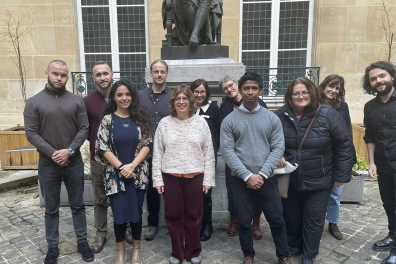Launch of the LULaC project - Lesser-Used Languages Classroom
Inalco and three other EUniWell members have received a grant from the European Erasmus+ program to implement an Inalco-led project on the digital teaching of so-called "lesser-used" languages.

The four partner universities met at Inalco's Maison de la Recherche on November 21 and 22, 2024, to officially launch the project and plan activities for the next three years.
Coordinated by Inalco, in collaboration with the University of Cologne, the University of Florence and the Taras Shevchenko National University in Kyiv, the LULaC Lesser-Used Languages Classroom project aims to launch a digital platform dedicated to the teaching and learning of lesser-used languages.
By October 2027, the partners will develop teaching materials based on the Common European Framework of Reference for Languages (CEFR) for pilot languages, including Ukrainian. They will then launch two courts on the EUniWell digital learning platform.
The aim of LULaC is to promote linguistic diversity by addressing the lack of tools and resources for teaching and learning lesser-used languages, compared with the dominant languages in language teaching. The use of the CEFR, already widely used for dominant languages, makes it possible to standardize teaching and assessment methods, while the development of digital language teaching makes it possible to reach wider audiences and respond to the shortage of teachers and resources.
Funded by the European Union. The views and opinions expressed are those of the authors and do not necessarily reflect those of the European Union or the French National Erasmus+ Agency. They do not engage the responsibility of the European Union or the granting authority.
